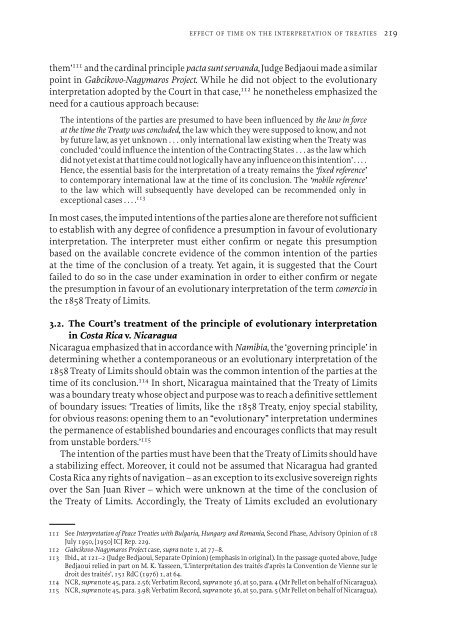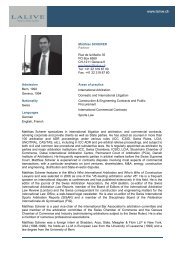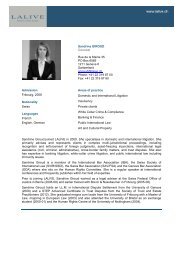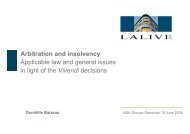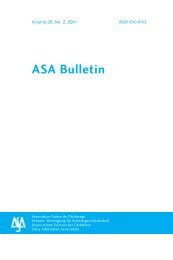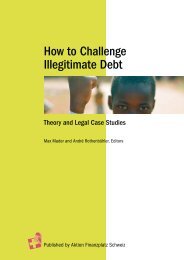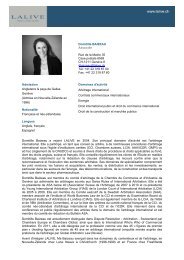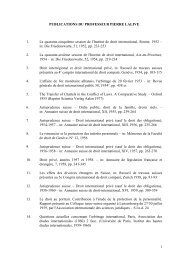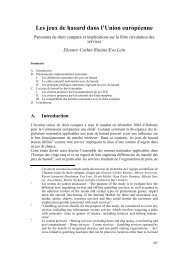The Effect of the Passage of Time on the Interpretation of Treaties ...
The Effect of the Passage of Time on the Interpretation of Treaties ...
The Effect of the Passage of Time on the Interpretation of Treaties ...
Create successful ePaper yourself
Turn your PDF publications into a flip-book with our unique Google optimized e-Paper software.
EFFECT OF TIME ON THE INTERPRETATION OF TREATIES 219<br />
<str<strong>on</strong>g>the</str<strong>on</strong>g>m’ 111 and<str<strong>on</strong>g>the</str<strong>on</strong>g>cardinalprinciplepactasuntservanda,JudgeBedjaouimadeasimilar<br />
point in Gabcikovo-Nagymaros Project. While he did not object to <str<strong>on</strong>g>the</str<strong>on</strong>g> evoluti<strong>on</strong>ary<br />
interpretati<strong>on</strong> adopted by <str<strong>on</strong>g>the</str<strong>on</strong>g> Court in that case, 112 he n<strong>on</strong>e<str<strong>on</strong>g>the</str<strong>on</strong>g>less emphasized <str<strong>on</strong>g>the</str<strong>on</strong>g><br />
need for a cautious approach because:<br />
<str<strong>on</strong>g>The</str<strong>on</strong>g> intenti<strong>on</strong>s <str<strong>on</strong>g>of</str<strong>on</strong>g> <str<strong>on</strong>g>the</str<strong>on</strong>g> parties are presumed to have been influenced by <str<strong>on</strong>g>the</str<strong>on</strong>g> law in force<br />
at <str<strong>on</strong>g>the</str<strong>on</strong>g> time <str<strong>on</strong>g>the</str<strong>on</strong>g> Treaty was c<strong>on</strong>cluded, <str<strong>on</strong>g>the</str<strong>on</strong>g> law which <str<strong>on</strong>g>the</str<strong>on</strong>g>y were supposed to know, and not<br />
by future law, as yet unknown ...<strong>on</strong>ly internati<strong>on</strong>al law existing when <str<strong>on</strong>g>the</str<strong>on</strong>g> Treaty was<br />
c<strong>on</strong>cluded ‘could influence <str<strong>on</strong>g>the</str<strong>on</strong>g> intenti<strong>on</strong> <str<strong>on</strong>g>of</str<strong>on</strong>g> <str<strong>on</strong>g>the</str<strong>on</strong>g> C<strong>on</strong>tracting States ...as <str<strong>on</strong>g>the</str<strong>on</strong>g> law which<br />
didnotyetexistatthattimecouldnotlogicallyhaveanyinfluence<strong>on</strong>thisintenti<strong>on</strong>’. . . .<br />
Hence, <str<strong>on</strong>g>the</str<strong>on</strong>g> essential basis for <str<strong>on</strong>g>the</str<strong>on</strong>g> interpretati<strong>on</strong> <str<strong>on</strong>g>of</str<strong>on</strong>g> a treaty remains <str<strong>on</strong>g>the</str<strong>on</strong>g> ‘fixed reference’<br />
to c<strong>on</strong>temporary internati<strong>on</strong>al law at <str<strong>on</strong>g>the</str<strong>on</strong>g> time <str<strong>on</strong>g>of</str<strong>on</strong>g> its c<strong>on</strong>clusi<strong>on</strong>. <str<strong>on</strong>g>The</str<strong>on</strong>g> ‘mobile reference’<br />
to <str<strong>on</strong>g>the</str<strong>on</strong>g> law which will subsequently have developed can be recommended <strong>on</strong>ly in<br />
excepti<strong>on</strong>al cases . . . . 113<br />
In most cases, <str<strong>on</strong>g>the</str<strong>on</strong>g> imputed intenti<strong>on</strong>s <str<strong>on</strong>g>of</str<strong>on</strong>g> <str<strong>on</strong>g>the</str<strong>on</strong>g> parties al<strong>on</strong>e are <str<strong>on</strong>g>the</str<strong>on</strong>g>refore not sufficient<br />
to establish with any degree <str<strong>on</strong>g>of</str<strong>on</strong>g> c<strong>on</strong>fidence a presumpti<strong>on</strong> in favour <str<strong>on</strong>g>of</str<strong>on</strong>g> evoluti<strong>on</strong>ary<br />
interpretati<strong>on</strong>. <str<strong>on</strong>g>The</str<strong>on</strong>g> interpreter must ei<str<strong>on</strong>g>the</str<strong>on</strong>g>r c<strong>on</strong>firm or negate this presumpti<strong>on</strong><br />
based <strong>on</strong> <str<strong>on</strong>g>the</str<strong>on</strong>g> available c<strong>on</strong>crete evidence <str<strong>on</strong>g>of</str<strong>on</strong>g> <str<strong>on</strong>g>the</str<strong>on</strong>g> comm<strong>on</strong> intenti<strong>on</strong> <str<strong>on</strong>g>of</str<strong>on</strong>g> <str<strong>on</strong>g>the</str<strong>on</strong>g> parties<br />
at <str<strong>on</strong>g>the</str<strong>on</strong>g> time <str<strong>on</strong>g>of</str<strong>on</strong>g> <str<strong>on</strong>g>the</str<strong>on</strong>g> c<strong>on</strong>clusi<strong>on</strong> <str<strong>on</strong>g>of</str<strong>on</strong>g> a treaty. Yet again, it is suggested that <str<strong>on</strong>g>the</str<strong>on</strong>g> Court<br />
failed to do so in <str<strong>on</strong>g>the</str<strong>on</strong>g> case under examinati<strong>on</strong> in order to ei<str<strong>on</strong>g>the</str<strong>on</strong>g>r c<strong>on</strong>firm or negate<br />
<str<strong>on</strong>g>the</str<strong>on</strong>g> presumpti<strong>on</strong> in favour <str<strong>on</strong>g>of</str<strong>on</strong>g> an evoluti<strong>on</strong>ary interpretati<strong>on</strong> <str<strong>on</strong>g>of</str<strong>on</strong>g> <str<strong>on</strong>g>the</str<strong>on</strong>g> term comercio in<br />
<str<strong>on</strong>g>the</str<strong>on</strong>g> 1858 Treaty <str<strong>on</strong>g>of</str<strong>on</strong>g> Limits.<br />
3.2. <str<strong>on</strong>g>The</str<strong>on</strong>g> Court’s treatment <str<strong>on</strong>g>of</str<strong>on</strong>g> <str<strong>on</strong>g>the</str<strong>on</strong>g> principle <str<strong>on</strong>g>of</str<strong>on</strong>g> evoluti<strong>on</strong>ary interpretati<strong>on</strong><br />
in Costa Rica v. Nicaragua<br />
Nicaragua emphasized that in accordance with Namibia, <str<strong>on</strong>g>the</str<strong>on</strong>g> ‘governing principle’ in<br />
determining whe<str<strong>on</strong>g>the</str<strong>on</strong>g>r a c<strong>on</strong>temporaneous or an evoluti<strong>on</strong>ary interpretati<strong>on</strong> <str<strong>on</strong>g>of</str<strong>on</strong>g> <str<strong>on</strong>g>the</str<strong>on</strong>g><br />
1858 Treaty <str<strong>on</strong>g>of</str<strong>on</strong>g> Limits should obtain was <str<strong>on</strong>g>the</str<strong>on</strong>g> comm<strong>on</strong> intenti<strong>on</strong> <str<strong>on</strong>g>of</str<strong>on</strong>g> <str<strong>on</strong>g>the</str<strong>on</strong>g> parties at <str<strong>on</strong>g>the</str<strong>on</strong>g><br />
time <str<strong>on</strong>g>of</str<strong>on</strong>g> its c<strong>on</strong>clusi<strong>on</strong>. 114 In short, Nicaragua maintained that <str<strong>on</strong>g>the</str<strong>on</strong>g> Treaty <str<strong>on</strong>g>of</str<strong>on</strong>g> Limits<br />
was a boundary treaty whose object and purpose was to reach a definitive settlement<br />
<str<strong>on</strong>g>of</str<strong>on</strong>g> boundary issues: ‘<strong>Treaties</strong> <str<strong>on</strong>g>of</str<strong>on</strong>g> limits, like <str<strong>on</strong>g>the</str<strong>on</strong>g> 1858 Treaty, enjoy special stability,<br />
for obvious reas<strong>on</strong>s: opening <str<strong>on</strong>g>the</str<strong>on</strong>g>m to an “evoluti<strong>on</strong>ary” interpretati<strong>on</strong> undermines<br />
<str<strong>on</strong>g>the</str<strong>on</strong>g> permanence <str<strong>on</strong>g>of</str<strong>on</strong>g> established boundaries and encourages c<strong>on</strong>flicts that may result<br />
from unstable borders.’ 115<br />
<str<strong>on</strong>g>The</str<strong>on</strong>g> intenti<strong>on</strong> <str<strong>on</strong>g>of</str<strong>on</strong>g> <str<strong>on</strong>g>the</str<strong>on</strong>g> parties must have been that <str<strong>on</strong>g>the</str<strong>on</strong>g> Treaty <str<strong>on</strong>g>of</str<strong>on</strong>g> Limits should have<br />
a stabilizing effect. Moreover, it could not be assumed that Nicaragua had granted<br />
Costa Rica any rights <str<strong>on</strong>g>of</str<strong>on</strong>g> navigati<strong>on</strong> – as an excepti<strong>on</strong> to its exclusive sovereign rights<br />
over <str<strong>on</strong>g>the</str<strong>on</strong>g> San Juan River – which were unknown at <str<strong>on</strong>g>the</str<strong>on</strong>g> time <str<strong>on</strong>g>of</str<strong>on</strong>g> <str<strong>on</strong>g>the</str<strong>on</strong>g> c<strong>on</strong>clusi<strong>on</strong> <str<strong>on</strong>g>of</str<strong>on</strong>g><br />
<str<strong>on</strong>g>the</str<strong>on</strong>g> Treaty <str<strong>on</strong>g>of</str<strong>on</strong>g> Limits. Accordingly, <str<strong>on</strong>g>the</str<strong>on</strong>g> Treaty <str<strong>on</strong>g>of</str<strong>on</strong>g> Limits excluded an evoluti<strong>on</strong>ary<br />
`<br />
111 See Interpretati<strong>on</strong> <str<strong>on</strong>g>of</str<strong>on</strong>g> Peace <strong>Treaties</strong> with Bulgaria, Hungary and Romania, Sec<strong>on</strong>d Phase, Advisory Opini<strong>on</strong> <str<strong>on</strong>g>of</str<strong>on</strong>g> 18<br />
July 1950, [1950] ICJ Rep. 229.<br />
112 Gabcikovo-Nagymaros Project case, supra note 1, at 77–8.<br />
113 Ibid., at 121–2 (Judge Bedjaoui, Separate Opini<strong>on</strong>) (emphasis in original). In <str<strong>on</strong>g>the</str<strong>on</strong>g> passage quoted above, Judge<br />
Bedjaoui relied in part <strong>on</strong> M. K. Yasseen, ‘L’interpr etati<strong>on</strong> ´ des trait es ´ d’apres la C<strong>on</strong>venti<strong>on</strong> de Vienne sur le<br />
droit des traités’, 151 RdC (1976) 1, at 64.<br />
114 NCR, supra note 45, para. 2.56; Verbatim Record, supra note 36, at 50, para. 4 (Mr Pellet <strong>on</strong> behalf <str<strong>on</strong>g>of</str<strong>on</strong>g> Nicaragua).<br />
115 NCR, supra note 45, para. 3.98; Verbatim Record, supra note 36, at 50, para. 5 (Mr Pellet <strong>on</strong> behalf <str<strong>on</strong>g>of</str<strong>on</strong>g> Nicaragua).


